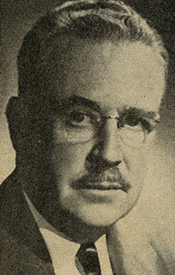Discover Your Roots
SIGN UPDiscover Your Roots
SIGN UPHenderson is a male name of English origin, meaning "Son Of Henry/Hendrick." It is derived from the surname Henderson and is associated with the Scottish Clan Henderson. The name has been used as a surname and a given name, and it is commonly found in English-speaking countries such as the United States, Canada, Australia, and New Zealand. Additionally, there are various places, geographic features, companies, constructs, and cultural references associated with the name Henderson. Furthermore, the name has been used for airports, churches, schools, and universities, reflecting its widespread presence in different aspects of society. Overall, Henderson is a meaningful name with a rich history and wide-reaching associations.

Henderson Forsythe (1917-2006) was an acclaimed American actor, best known for his iconic portrayal of Dr. David Stewart on the long-running soap opera As the World Turns, a role he brilliantly portrayed for over three decades. Forsythe's talent also shone on the New York stage, where he earned a Tony Award for Best Featured Actor (Musical) for his exceptional performance in The Best Little Whorehouse in Texas. His stage repertoire also included notable appearances in productions like Who's Afraid of Virginia Woolf? and The Birthday Party.On the small screen, Forsythe captivated audiences with his recurring role as Big Bud on the television series Eight is Enough, and his appearances in prime time soaps like Eisenhower and Lutz. His film credits include memorable roles in Silkwood and Chances Are. Off-screen, Forsythe shared his life with actress Dorothea Maria Carlson, and together they raised two sons, Eric and Jason. His timeless talent and contribution to the entertainment industry will always be remembered.

The Henderson Brooks-Bhagat report, also known as the Henderson Brooks report, is the result of an investigative commission that reviewed the Indian Army's operations during the Sino-Indian War of 1962. Commissioned by General J. N. Chaudhuri, the report was written by Lieutenant-General T.B. Henderson Brooks and Brigadier Premindra Singh Bhagat. Despite being classified by the Government of India for national security reasons, journalist Neville Maxwell obtained and published part of the report, which is generally considered authentic by scholars. The report was critical of the Indian Army's high command and the execution of operations during the war. It highlighted discrepancies between the military and political approaches to the conflict. The report's continued classification has sparked public controversy, with successive Indian governments refusing to declassify it, citing its sensitivity and current operational value. The reluctance to release the report has led to speculation about its potential impact on historical narratives and political targets. Despite being classified, the report was utilized in writing the official history of the war.

Henderson Haverfield Carson (1893-1971) was a prominent U.S. Representative from Ohio during the 1940s. Born near Cadiz, Ohio, he pursued education at Cleveland Law School and Baldwin-Wallace College, obtaining his LL.B. in 1919. His career began with the legal department of the Pennsylvania Railroad Co. in 1915, and he later served in the Field Artillery during World War I. Following his discharge, Carson was admitted to the bar and established his practice in Canton, Ohio, where he also taught at McKinley Law School. A Republican, he served in the Seventy-eighth and Eightieth Congresses but faced unsuccessful reelection bids. After his congressional terms, Carson resumed his legal practice in Canton and Washington, D.C. until his passing in 1971. He was laid to rest in West Lawn Cemetery. Carson's contributions to Ohio's political landscape and his legal expertise left a lasting impact, cementing his legacy in U.S. history.

Henderson Walker (1659-1704) was the Acting Deputy Governor of North Carolina from 1699 to 1704, known for his role in the founding of the Church of England in the Albemarle Sound region. Born in 1659, Walker arrived in Albemarle County around 1682, where he became a clerk of the county courts and held various other public offices, including attorney general, judge of the supreme court, and President of the Council. In 1699, after the death of Governor Thomas Harvey, Walker was appointed as the Acting Deputy Governor of North Carolina. His tenure brought peace and economic growth to the region, attracting many Virginians in search of economic opportunities. However, his support for the English Crown and efforts to establish the Church of England led to conflicts and rebellions, including Cary's Rebellion and the Regulator Rebellion. In 1703, he resigned from the governor's office and continued to serve as a council member until his death on 14 April 1704. Walker was buried at St. Paul's Church, Edenton. He was married twice, first to Deborah Green and later to Ann Lillington.

Henderson Ricardo "Hendy" Bryan, born on 17 March 1970, is a former Barbadian cricketer known for his all-rounder skills. He represented West Indies in 15 One Day Internationals (ODIs) and made his ODI debut against Australia at Kingstown. Despite being dismissed for a 'duck' in his debut match, he showcased his talent by achieving his career best ODI figure of 10-1-24-4, leading to him being honored with the Man of the Match Award. Bryan also played a pivotal role in the 1999 Cricket World Cup as a part of the West Indies team. His domestic cricket career includes representing Barbados and Griqualand West. With a remarkable track record in both international and domestic cricket, Bryan has left a lasting impact on the sport.
All images displayed on this page are sourced from Wikipedia or Wikimedia Commons.We use these images under their respective Creative Commons or public domain licenses. Wherever applicable, author attributions and license information are provided. If you believe an image is used incorrectly or outside its license terms, please contact us so that we can review and correct the issue.